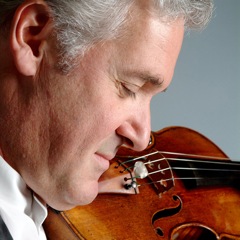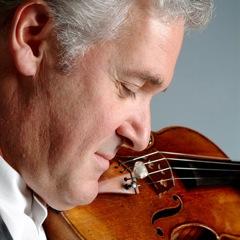
Featured Video
Buy Tickets
Pinchas Zukerman, violin & The Zukerman Chamber Players
Venue: Zellerbach HallCity: Berkeley
Date: February 12, 2011 8:00 PM
Price Range: $42/$56/$64/$72
If you’re looking for an inspiring Valentine’s Day gift, why not consider a ticket from Cal Performances? One of today’s most inspiring and internationally recognized violinists is coming to Berkeley. Pinchas Zukerman and the Zukerman ChamberPlayers will be performing Feb. 12, in a program featuring Mozart and Brahms, and Feb. 13, with music by Brahms, Mozart, and Schumann. Two programs; two fabulous gift opportunities.
Zuckerman has been at the forefront of classical music since the 1960s. Born in Israel, he came to the U.S. as a teenager to study in New York. He first made his name as a performer, on both violin and viola, but has added conducting to his repertoire. Currently the music director of the National Arts Centre in Ottawa and principal guest conductor of the Royal Philharmonic Orchestra in London, he still finds time to perform around the world, record, and take an active role in the cultural life of Ottawa. As he says, he’s had a great life.
You’re coming to Cal Performances with the Zukerman ChamberPlayers. Tell me about the group.
There were five of us. We started about six or seven years ago, solely as a string quintet with two violas. We ran out of repertoire. We added pianists to the group. Angela [Cheng], our current pianist, lives in Oberlin where she teaches. Two members of the group, Jessica [Linnebach, violin] and Jethro [Marks, viola], were students of mine ages ago. Amanda [Forsyth, cello] is my wife. We all play together.
Sometimes we play with our principal bass. We’ve played with a second cello. Sometimes we’re a piano quintet; sometimes a string quintet. We play about 25 to 30 concerts a year.
Are you looking forward to being in the Bay Area?
Yes. Matías [Tarnopolsky, Cal Performances’ director], we all knew him, so when he took over the job and asked if we would come, we said yes. I know the area. My second daughter went to Berkeley for a while. It’s a wonderful place.
You left home at age 14 to move to New York and attend Juilliard. That must have been a massive change. What was it like at that age?
It was a huge change. I was away from home. I knew very few words of English. At that time in Israel, it was very unusual. Now, when you leave Israel, you go in different directions. At that time you only went west.
It was very difficult, being alone. But I had a lot of good background in my DNA. I learned a lot and I saw a lot. New York offers so much. I had great people around me and I got to start playing with them.
You started with recorder and clarinet. Why did you turn to violin?
I was about 7½. My father gave me a violin and started to teach me. After about six months, I moved on to work with Ilona Feher until I left for New York.
You were “discovered” by Isaac Stern and Pablo Casals. How did that come about?
In those days, when people came to Israel, there were a number of kids that were always asked to play. I was one of the ones asked.
How did you start to play the viola?
It was a supplement to learn music and to play chamber music. It was the whole idea of playing “on the other side.” Your playing becomes more horizontal rather than vertical. You do learn in class, but this involves practicing the other instrument. We make a lot of the kids learn the other instruments: Violinists learn viola; violists learn violin. It opens up your ears.
How did you move to conducting?
That happened a long time ago. Conducting is an extension of music making. I was fortunate that I had the physical ability of coordinating my hands and body.
And you’re still teaching?
Of course. I teach at the Manhattan School of Music, the Performance Program. My assistant, Patrinka Kopec, is wonderful. She sees the students all the time. We have the Summer Music Institute in Ottawa, with conductors and composers and a corps of assistants. It’s an ongoing tradition.
Your daughters are also involved in music, though in different genres.
Yes, Arianna is a soprano. Natalia is more of a blues/rock mixture; she’s just back from a tour in Japan. They found their natural extension. They’re very different people, even in looks. But they’re two wonderful people. I’m very lucky.
What do you do in your spare time?
Well, I don’t have much. But Amanda and I travel to different places for two to four days [at a stretch]. We travel so much anyway, though. We see friends, watch movies. It’s a normal life.
What would you have done if you weren’t a musician?
I had dreamed of being Jimmy Connors, but I gave that up. I play tennis. It’s very difficult and I have to be careful. You can hurt your shoulder and arm. But I still love the game. I also do some swimming. But I can’t imagine doing anything but music.
What are you listening to these days?
What I have to work on. I practice every day; you have to. There are all the large and small pieces I need to work on.
Chamber music is the cornerstone of my existence, but I play such a variety. For example, I’ll play in San Francisco, then I’ll be playing a viola concert in Seattle. After that, I’ll play Beethoven in Vancouver. It keeps it interesting.

